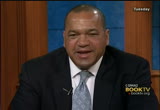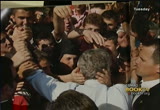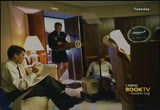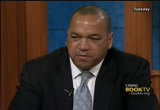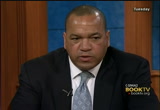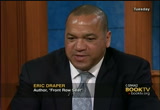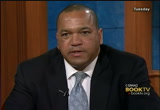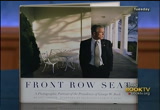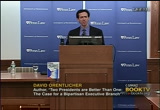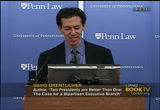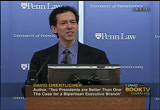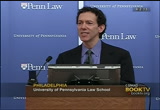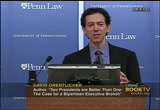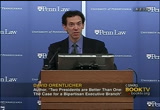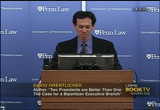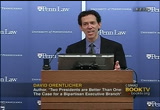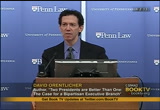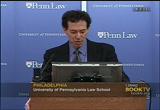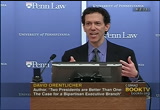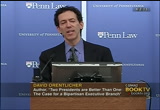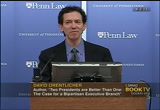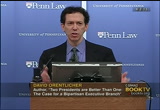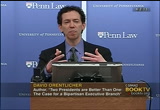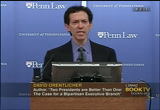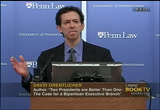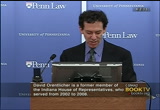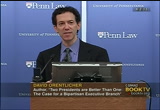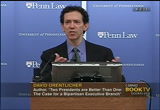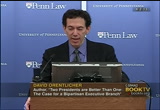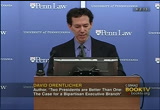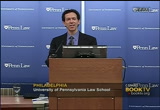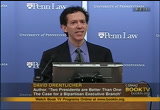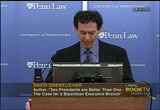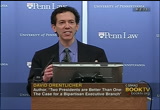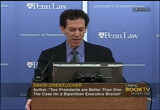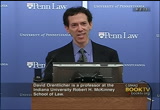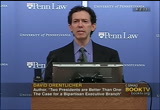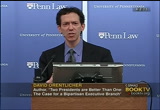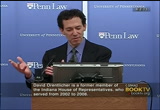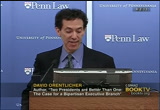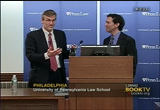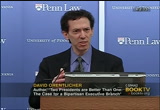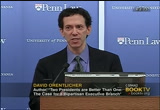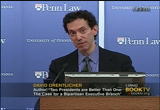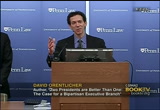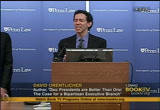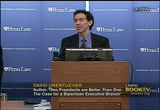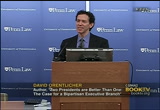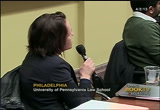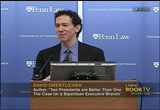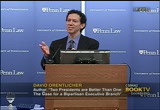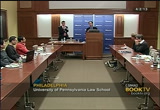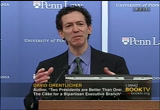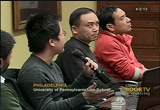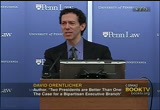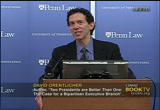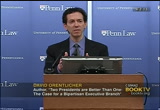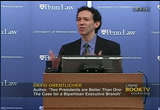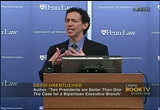tv Book TV CSPAN April 20, 2013 9:00pm-10:01pm EDT
9:00 pm
there's a video. were you there? were you present? what was that moment like? >> guest: it was fun, it was fun and the crowd went crazy when he started to dance. he actually -- >> host: did you shoot some photos of that? >> guest: yeah, was very fun. >> host: in the introduction to the book you got to have it developing slideshow for the president on the flight home. >> guest: yeah. it was something that i started following 9/11, one of the first trips abroad. i tried to create a show to kind of lift the spirits of everyone traveling, to kind of show the hard work that was put into a lot of these trips. i started doing it after every trip abroad. every trip i would raise the bar and add graphics and titles and the president and mrs. bush
9:01 pm
always looked forward to the slideshow. it was like every trip it was very enjoyable to produce. >> host: did you have an office office on air force one we could develop for a computer, gessa computer in this case? >> guest: exactly and this was at the time that i directed the whitehouse film digital and all the work was done on my laptop. while everyone else was sleeping i was up pounding away and creating the slideshow to play just before we landed. >> host: eric draper this photo? >> guest: at air force one navy machine, it's basically a flying whitehouse and this is the conference room aboard air force one and the president literally took almost anything aboard the plane including preparing for a speech. he has got the teleprompter and
9:02 pm
the mock podium and the president would exercise on air force one. it was really -- it never got old. i felt very blessed to be able to see the world aboard that plane. >> host: here is a photo, january 2009. >> guest: yes, the president in the oval office. this was after the election, so obama, president obama hadn't been sworn in yet and there was a meeting in the oval office and a lunch with the five presidents. definitely a rare opportunity to see a lot of history all in one room. >> host: have you ever counted up how many people up in the same room as those five presidents? >> guest: know so is very special. >> host: back to george h.w.
9:03 pm
and barbara bush. a lot of photos of them in here as well including one of barbara bush with her camera. >> guest: yeah, she was a really good photographer actually. she would photograph me with president h.w. bush and president george w. bush and send me the photos signed by can record time. she was amazing. >> host: here's another photo of mrs. bush, barbara bush. >> guest: yes, this was election evening 2004 very late at night. actually it might have been early in the morning. we had just learned that president bush was ahead mathematically to win the election. so the family decided it was time to celebrate with a conga line. >> host: how often would you
9:04 pm
alone, just you and the bush family? >> guest: a lot, a lot. especially around family gatherings and around holidays. typically for example every christmas i was invited to camp david to photograph the family. the best thing was my wife was with me the same time so she could be with me and i could enjoy the holidays with her and i would photograph the family around christmastime. there was always a huge family portrait which was important to them, to get everyone together in one shot. i would do that every christmas. >> host: you say in here was like herding cats. >> guest: the bush family is large and just like any family they were very busy doing lots of things other than waiting for a photo. >> host: what was it like, in the forward you said you put your life on hold for eight years. here you are at easter in
9:05 pm
crawford texas. >> guest: right, i try to document family life which meant, family was very important to president bush to be together for the special holidays. and it also meant that my holiday was spent either at the ranch or at camp david and i actually enjoyed that. my wife would also be invited to fly on air force one which was nice for her. the president always wanted to keep the staff and family together if there was an opportunity for that. >> host: did your wife get to know the bushes as well? >> guest: oh yeah. >> host: did you agree with him particularly? >> guest: to be honest for most things i did. >> host: eric draper
9:06 pm
january 20, 2009. >> guest: yes, so this moment i have been waiting for for literally years because i was there when the president walked through the oval office doors for the very first time and i wanted to be there for the very last time walking out the main door. so, there i was that morning around 8:00. i had always envisioned what that moment would be like. i thought it would read emotional with people crying and hugging and reminiscing but it was very simple, very anti-climatic. the president asked for his coat and turned around and walked out and didn't look back. very simple. >> host: the book is called "front row seat" a photographic portrait of the presidency of george w. bush photographer and author eric draper who spent years with president george w. bush's photographer and you are watching booktv.
9:07 pm
>> coming up next david orentlicher argues that a single person presidency is outdated and should be replaced by a two two-person, two-party executive branch. it is one hour. >> thank you very much for having me. i'm grateful for the opportunity to share my ideas about political dysfunction and how we can fix fix it. i began my thinking about two presidents estate serving in the indiana house of representatives, house of representatives and i was there for three terms. like most candidates when i first started running i pledge to be bipartisan. i was going to work with my
9:08 pm
colleagues colleagues across the aisle and i would support good ideas whether they were democratic or republican. and i tried very hard to do that. but i did find that very quickly it's very difficult to remain above the party fray and i came to the conclusion that you don't get heart is in conflict in washington or indianapolis because we elect people who are inclined to be partisan. there is not a selection bias here. the problem is our system, our political system drives the electoral decisions to be partisan. so i thought about it. i'm very madisonian about this when i think about how to structure it. i thought, what is said about our political system that fuels partisan conflict and that is where i came to the idea which is the topic of my book, partisan conflict of the at the national level is driven largely by the fact that if all of the executive power to one person,
9:09 pm
single person rather than having the executive power divided among multiple officeholders. so i wanted to persuade you with two points today. one the political dysfunction was with the founding fathers and the best way to address political dysfunction is to change to a two-person, two-party presidency in which the two presidents are truly equal. they may come from different parts and ordinarily that would be democratic and republican that third-party candidates would certainly be eligible and in fact would be more likely that we would get third-party candidates because it's easier to run the second first in our country. so before i make my argument about why a single president is bad in two presidents are good, what do i mean by a two-person bipartisan presidency? what would it look like? the two presidents would have to be equal partners. if a bill passed congress both would have to sign before to
9:10 pm
become law. they would have to agree on executive order, sipri court nominees, decisions as commander-in-chief of the military. each would have their own vice president for a small personal staff but all other appointments the executive branch or the judiciary would be a single joint appointee. with that they could make decisions so much more quickly. you sort of have a democrat nominating a democratic person or republican for republican. you would have a bipartisan nominee and there wouldn't be a confirmation in the position will be filled much more quick way. in all likelihood they would divide up primary responsibilities. one might direct health care and the other education. one might focus on our relations with european countries and the other with asian countries but when it would come time to make
9:11 pm
decisions they would have to agree. all decisions would have to be shared decisions. joint decision would make it more representative decision-making. instead of having a republican president champing the platform of the republican party or a democratic president pressing the policies of the democratic party, we would have presidential partners abdicating policies that would represent the views of the full range of voters. so how do we trace political dysfunction? we can trace it to the single presidency and why do i say that? is congress the problem? our senators and representatives can pass bills to balance our budget. they can't do anything about global warming or gun violence. even back on march 1 when they were faced with the sequester with these large across-the-board budget cuts, that could even get to them to agree on a sensible budget reduction plan.
9:12 pm
but i think if we focus on congress or focus on the system rather than the cause of the problem. the problem with congress is a result of the people problems that i want to suggest and that is the founding fathers decision to place a single executive at the top, the executive branch, a single president. why is having a single president a problem? what's wrong with that? what would happen his modern presidents exercising central power. but arthur schlesinger called an imperial presidency. because president wield their immense power on behalf of only one party, the fuel of high-level artisan conflict in washington. and because they exercise their immense power on behalf of only one perspective they make too many decisions that are detrimental to national interest. if you want to talk about how we got to the imperial presidency
9:13 pm
and why causes problems, the founding fathers of course worried about power. they worried about different branches becoming too powerful but they didn't protect against the imperial presidency so they didn't anticipate the central role of the executive branch would play in our government. the framers worried about the legislative branch. they thought congress would become the dominant institution over time if anything so when they will the constitution, that was a concern. a too powerful congress said they took that legislative conference and divided the legislative power in the house in the senate and gave the president a veto and so on. but, they misjudged things. my wife says i shouldn't criticize the framers but they did get this wrong. over the past 75 years congress transferred much of its authority to the executive ranch.
9:14 pm
we have the creation of the administrative state in all these agencies ,-com,-com ma the environmental protection agency housing and urban development health and human services and so on and with the huge growth of the administrative state and the departments and agencies, the presidents have gained considerable and unanticipated domestic policymaking power. the president controls the issuing of other regulations whether it's air quality, energy exploration k-12 education health care consumer protection and down the line. all these different concerns. the rulemaking is overseen by the president. it's not only the rulemaking. presidents have other power making tools at their disposal. so they can shape national policy through their signing statements and through their executive order. they can grant waivers for statutory application so it's easy to find examples just from recent years.
9:15 pm
president obama, under president obama's direction we now have a doubling of fuel efficiency for cars that will take effect between now and 2025. obama decided to expand offshore drilling for oil and gas. he granted lots of waivers to states that would require the "no child left behind" statutes and now most of the central provisions, the states are bound by that. or we think about -- vice president bush decided we would need federal funding for stem cell research. all these decisions are made by presidents. this is just on the domestic side. on the foreign-policy side presidents have even more power. the president plays a far larger role in the determination of u.s. policy and congress plays a far smaller role than the framers intended. the recent illustration is
9:16 pm
president obama decided our military would be involved in intervening in libya would be his decision even though congress is supposed to decide when we send troops into battle. but obama and many presidents have decided on their own without waiting for congress. presidents also reach agreements with other countries without congressional participation unilaterally decide about terminating a treaty when we change from recognizing taiwan as a government to mainland china. it was president carter who unilaterally terminated the mutual defense in taiwan. presidents decide on their own whether allowing u.s. citizens to travel abroad. it was a presidential decision. he also revived our immigration policy. when congress failed to create a path for young immigrants to be brought and -- president
9:17 pm
implemented his own d.r.e.a.m. act. he waive deportation and said i will grant for permits to young immigrants. now it's not -- so presidential power increase transfer of power and presence have acted on their own so there has been a shift of power but the other part of the piece of the puzzle is the vast expansion of u.s. power. the founders lived the world's powers were in europe and now the united states has become the great world power so presidential power has increased both because the u.s. power has increased dramatically and the power that the u.s. government has been shifted from congress to the white house. so we no longer have the constitution designed for coequal branches of government. we now have a politically
9:18 pm
dominant executive branch. so what do we do about it? many scholars say congress needs to assert itself and use its checking and balancing of power. if the congress serve this role we wouldn't have things like watergate in abu ghraib and other presidential authority. the problem is congress has proven incapable for various reason collective action but congress has proven incapable of fulfilling these check and balancing rules and the transfer much of their authority to the white house. all of the scholars are not worried about this. congress they say look, congress can't act decisively or did -- efficiently. it may have made sense to have a powerful congress released a coequal congress 200 years ago but in the modern american state with a local economy in the fast-moving technology we need a very strong executive. now, i don't think we need to settle that, whether we should have a powerful executive or not
9:19 pm
is not critical to my argument because even if the executive branch is not accumulating too much power it has amassed too much power for one person. that's the problem. because when one person exercises the summer must power in the modern u.s. presidency we shouldn't be surprised if the system breaks down. a single president represents the views of one political party. all of us want to have a voice but only have the public has a meaningful input. currently we have a democratic president who represents the views of the democratic voters. from 2001 to 2008 where the republican president who represent the views of republican voters so it's no wonder when you have one president from one party that the party out of power spends all of its time trying to regain the oval office and not enough that it's time trying to
9:20 pm
adjust -- so under the current system democrats and republicans fight tooth and nail every four years for the white house. hundreds of millions and now billions of dollars but once the election is over, the new cycle begins. candidates start traveling to new hampshire and iowa and what happens in congress is the president party lines up behind the president's initiatives to bolster the president and make sure they obtain the white house and the losing party tries to block presidential initiatives so it can weaken the white house, weaken the presidency and then went back in the next election. remember when health care reform was being debated former senator jim demint from south carolina told his colleagues the need to vote against obama cared cared we need to break the obama administration. senator mcconnell for senate majority leader from the republicans announcing in 2010
9:21 pm
that his highest priority, the senate majority leader was making barack obama the one-term president. if we had a coalition presidency were each party would elect a partner it wouldn't stand to gain as much clinical opposition. no matter what they did it was still share the white house with the other party so then it would be much freer to judge legislative proposals on their merits. so to put it another way, it's not surprising when you have a winner-take-all election for presidency whose power has grown to a level of the presidency you shouldn't be surprised that we have high levels of partisan conflict. indeed if you go back the increase in partisan conflict, to go back to the 50s and 60's there is much more of a cross party lines. if you look at partisan conflict
9:22 pm
graph it has risen since the 40s in the 50s grassley to levels we have today. presidential powers have increased at the same time so it's not surprising. so as they say you now have people elected with a small majority or even a minority of the popular vote and you have substantial numbers of voters who feel that their interests and concerns aren't represented in a politically dominant white house. if you had a two-person presidency all voters would have their preferred candidate serving and it may be much more comfortable exerted from the executive branch. it would no longer be this massive disaffected voters who are -- to policy of destruction. are there other causes of partisan conflict plex i don't want to suggest the imperial presidency is the only cause. there are other factors involved but even so the argument for bipartisan executive is strong. if elected officials had us tron
9:23 pm
for centers for whatever reason to act in a highly partisan fashion needs to have counter incentives to act in a bipartisan fashion. a bipartisan executive would not only address the imperial presidency factor but it would also provide an effective counterbalance. there is another problem with having a one person imperial presidency. in bytes decision-making horrible to the country and here is another area where the framers, things have changed in the ways framers didn't anticipate because with a substantial increase in presidential power to change the nature of presidential power, the way the framers saw it, congress would be our policymaking branch and the president would be the executor. it's the executive branch. the president would need to implement her policy, not so much to shape the shaper of policy. the president now has become a
9:24 pm
major shaper, perhaps the primary creator of policy for our country. and that is not a good idea because when we have policy being made, we wanted to be made by multiple people with different perspectives in a robust debate in a deliberative process. the framers are right, if you have a president who's going to be an executor of policy ,-com,-com policy, yes you want a decisive person who can act with dispatch as they said that they correctly reserve policymaking for deliberative bodies like congress and the supreme court. as woodrow wasn't sent the whole purpose of democracy is that we may hold counsel with one another so as not to depend on the understanding of one man. and indeed when it comes to me can policy there isn't much truth to the maxim that two heads are better than one. if you look at the studies by economists psychologists and other researchers share decision-making works better than utero lateral
9:25 pm
decision-making. it's not hard to find examples of bad unilateral decision-making. i will pick on george w. bush and his decision to take us to iraq. two presidents, if you have two presidents from different parties than they would bring the different problem-solving approaches in the different skills to make for better decision-making. two presidents with different perspectives with make more good choices and fewer bad choices than single president. i understand single presidents of course don't act in isolation. they consult with members or cabinet and staff so they do enjoy many of the benefits of group decision-making. nevertheless there is a big difference between deciding a loan as the president is ultimately their decision at your consulting with people who are inclined to enforce their decision rather than --
9:26 pm
and example i would like to use to illustrate his imagine the spring court where you have nine justices and decision-making authority, different perspective so if you have one justice like scalia or ginsburg, your choice, and a very inexperienced law clerks it would be a very different supreme court. it's not only the two presidents would give us better leadership and the time for study and a liberation but even in times of crisis. what happens if we are attacked? do we need a single person? i don't think that's right. part of the problem is look what happens. when we are in times of crisis one of the problems with single decision-makers often at an authoritarian and unconstitutional ways. during world war ii we had the internment of japanese-americans. after 9/11 we have the torture of suspected terrorists.
9:27 pm
and having a single person make enough decisions, the congress and courts are supposed to check presidential abuses of power. what we have seen of course as congress has not stepped up when they needed to. so how did two persons i partisan presidencies would have this kind of internal check on it the executive branch that we need. precisely in emergencies when other checks are not affected. and two persons also have to sacrifice rapid decision-making. presidents always confer with trusted advisers before making even the most urgent decisions and consider israel. there is a country that has had to respond to attacks, major threats to national security and they always convened their cabinet. first a smaller national security cabinet and then their full cabinet for they decide on their response. in fact some deliberation is good. even in the face of unexpected
9:28 pm
events, international events. for example i like to use in 2008 during the presidential campaign when george and russia got into a little poor. john mccain immediately condemns russia. barack obama waits for a few days to find out and get more information and he did so wisely because it turned out board georgia and russia were at vault. so sometimes acting quickly and decisively can lead to bad decision-making. all right, why would wouldn't two presidents just bring their partisan conflict to the whitehouse? would mitt romney and barack obama really cooperate? that is what the framers were worried about. alexander hamilton talks about multiple executives on dissension and rivalry but i don't think that would happen. in fact, there is very good reason to think they will develop a cooperative relationship. first, they wouldn't have incentives to develop a complex
9:29 pm
will relationship. elected officials are highly partisan but they are for a purpose. the reason why is typical power-sharing settings, each person or different people feels that by maneuvering and jockeying for power they can establish a dominant position. that is -- but in the coalition presidency that i propose, no amount of maneuvering, backstabbing or doing whatever else could lead to a dominant position and matter what. it would be a 50/50 relationship for the current term and after re-election. there would be no way to change that so there would be incentives to engage in conflict. more than that, there would be a very important incentive to cooperate. when presidents reach the whitehouse, they are at the top of the political ladder. at that point, the primary concern is their legacy.
9:30 pm
how are they going to go down in the history books? george w. bush's decision to invade iraq was illustrative when he opposed saddam hussein. there were a number of reasons for his decision but one of the accounts and a very important one which was he was influenced by the potential for introducing democratic governance to the arab middle east. if we could set up the democratic government in iraq it would be a model for other countries. george w. bush's legacy would be transforming a major region of the world. ..
9:31 pm
>> for greatness he needed health care. the goal that eluded presidents for a century. well, two members of his coalition presidency spent their terms locking horns. they wouldn't be able to have the kind of achievements, establish the kind of record that would have an important legacy for the ages. so that's why i think they would work out. it's not only my fairly educated guess as i hope, but we have other support. switzerland, i like to use as an example. can this work? does this work anywhere else? well, switzerland, their executive branch, they call it a first of all council. has seven department heads, and they possess equal decision making authority. there's no first among equals,
9:32 pm
they really are true equals. they rotate through the presidency, but for one-year terms. the president's purely a ceremonial position. and for more than 50 years, the seven counselors, which they call them, have come from the major political parties. there are now five. they represent about 80%, if you look, they get about 80% of the vote during national elections, and the important thing is these seven people from different parties, different parts of the political spectrum, work cooperatively. and you might say, well, switzerland. but, in fact, switzerland has its own history of political conflict. they had a civil war in the 19th century. theirs was between catholics and protestants. not as bloody as ours, but it was a war. german, italian, romance citizens. and that's why they drafted their constitution, was to try to overcome the political
9:33 pm
conflict that they had experienced. and my view is because they have their power sharing across different divides, political and other divides, they've been able to have the kind of society that doesn't have the political conflict that we experience. france has also shown that shared decision making can work well. theirs is not as institutionalized as switzerland, but when presidents and prime ministers in france come from different parties, normally the president is the dominant political figure. so we all know about sarkozy, nicolas sarkozy. far fewer people know that francois was his prime minister. the president and prime minister come from different parties. the french call it cohabitation government. and for much of the time between 1986 and 2002, they had cohabitation governments. the first was chirac on the right, mitterand on the left, and they worked together
9:34 pm
reasonably well, and the governments were quite popular. the approval ratings for their cohabitation government certainly well above what we have for congress, but well above what our presidents get. about two-thirds, three-quarters of the public like their cohabitation government. and, of course, in all parliamentary systems you tend to have, you have cabinet -- it's common to have coalition governments, people from different parties working together. now, i know other countries clear orally differ in -- clearly differ in many ways from the united states, but i don't think there's any reason elected officials in other countries are less prone to conflict than our officials are. i'm also not claiming that shared power cures all political ills. bosnia and herzegovina have a three-person shared partnership, but their problems go far deeper than the nature of their executive branch. too much poverty, serbia and the
9:35 pm
other republic have too much power and so on. but as political scientist matthew sugared and -- have observed, coalition executives can offer the best possibility for resolving conflict in deeply divided societies. i want to turn to one other source of support for my argument. besides international experience, that's game theory. because game theory -- the study of strategic behavior -- tries to identify elements of relationships that encourage cooperation as opposed to conflict. and the kinds of relationships, the elements that are important are the kinds that would be, you know, part of the coalition presidency that i propose. one is that people have an ongoing relationship. they're much more likely to cooperate than if it's a one-shot relationship. i have a much better relationship with the guy that
9:36 pm
services my car than the people who i see when i buy the car because pat, my serviceman, knows i'm coming back. he treats me right and serves me well. so having an ongoing relationship, having regular communication, frequent interactions with your partner, that also encourages cooperation. that would be true about a coalition presidency. but most importantly, coalition presidencies, they have some -- there'd be a symmetrical relationship with respect to the amount of power. as i've indicated, the willingness of them to cooperate depends in large part that each has exactly half of executive power and no maneuvering could change that symmetry. neither one could gain the upper hand. and that's what game theory tells you. when you have that kind of a situation where they have little to gain by obstruction, lots to gain by collaboration, we should expect them to collaborate. and it's out of self-interest.
9:37 pm
i don't, i don't, you know, assume that they're going to do this for the good of the country. it's out of their own self-interest, their own desire for their legacy. and people with strong philosophical differences would work cooperatively may seem surprising. eric cantor and nancy pelosi, could they really work together? i think they would. and part of this i draw on my own experience as state representative and watching them there and also at the national level. because public officials do exhibit quite a bit of flexibility to achieve their political goals. mitt romney, right? governor of massachusetts. pushes for an individual mandate, health care. presidential candidate, opposes the individual mandate. for health care. arlen specter, as a republican, right? mostly as a republican moves the democratic party. his voting record shifts to the left. my own senator, evan bayh, when he was positioning himself for a run for the presidency, had a pretty liberal voting record.
9:38 pm
as soon as he withdrew and decided to run for re-election to the senate, he had the most conservative record of any democratic senator, even to the right of ben nelson from nebraska. or even our own academic peers. harold lowe, critic of president bush's, right? pushing executive power. works for the obama administration and changes his tune and takes positions he harshly criticized when he was outside the executive branch. so i think, you know, the desire, as i said, to leave a legacy, that's what drives presidents, and a lot of their statements and posture -- it's posturing much more than true commitment to ideology that they can't compromise. so let me conclude by saying that a two-person presidency may seem radical for us, not so radical for europe, but dysfunction in washington has gotten to the point that radical
9:39 pm
reform is needed. the alternative to a two-person presidency is even greater partisan conflict and even more bad presidential decisions. so thank you for coming, and i'll look forward to your questions. [applause] >> thank you very much. so we will, we will pass around the microphone. raise your hand, and we'll take questions. i'd like to start off with one question first. the, it seems to me the assumption you're making that having presidents from both parties they'll be able, going back to congress, to kind of lead their party along in congress. i'm wondering how you, how likely you view that as being in light of the fact that even the house sometimes majority leaders in the senate have a hard time bringing along their own members in their own chambers. how well could this, you know, representative of their party in
9:40 pm
the white house actually and the gridlock that exists within congress itself? >> yeah. that's a very good question, why wouldn't partisan conflict just move to the aisles of capitol hill? and that's a question, and here's why i'm not so worried about that. there are a couple of reasons why i think you'd start to see more cooperation in congress. and let me say i'm not against competition and disagreement as long as it's on the merits. i still want republican members of congress to advocate for republican ideas, democratic members of congress -- what i'm trying to avoid is the extent to which partisan conflict overtakes legitimate disagreement about the merits. so there are two reasons, a couple reasons why -- at least a couple reasons why i think will diffuse the acceptable level of partisan conflict and drive things more on the merits.
9:41 pm
one is now you're going to have, let's say romney and obama fashion their health care reform or immigration reform or climate change legislation, and they send their bipartisan proposal to congress. now that there's a bipartisan proposal, if members of congress, right, as -- currently when president obama sends his partisan proposal, remember, i said this is, my concern is there's this massive difference in voters. 47% of the public voted for mitt romney. 47% of the public don't think they have a voice in the white house. so their instinct is to say this is not, this proposal doesn't represent my views, and so their, you know, instinct is to oppose it. and so the members, the republican members of congress recognize this. and they know there's this substantial mass of disaffected voters who will be receptive to a policy of obstruction. now instead if you had a
9:42 pm
bipartisan proposal coming forward, now voters on both sides of the aisle are going to say that proposal represents my views. there was my president negotiating on behalf of me. and i think that so the members of congress who are going to, who might be inclined to obstruct purely for partisan purposes are not going to find a receptive audience among voters for that. another reason why i think they would be less inclined to be partisan, one of the things i learned as a legislator is you can do a lot for your constituents by passing bills, but you can often do more for your constituents by helping cut through the red tape and other hurdles in the bureaucracy. now, if you're a republican today and you call up the executive branch, you're not going to get much help because it's a democratic executive branch. but if it's a bipartisan executive branch, they are going to respond to your calls.
9:43 pm
so you have a lot of incentive to have good relationships with the white house because that's how you help your constituents, by helping them, you know, if e got a problem with the food and drug administration, the department of agriculture. you want to be able to help them. so it really changes having a receptive audience, public receptive to obstruction and the members of congress having their own personal representative if terms of helping their constituents and getting reelected to have cordial relations with the executive branch. i think that would help. >> excellent. thank you very much. we will open it up for questions. we'll turn the microphone over to you. >> i guess my question deals with the political process and how it would play with -- [inaudible] in presidential primaries one of the reasons candidates like to stay close to center is because they know they have a general election coming up. but when you know you're going to be like a president, once you win your democratic or
9:44 pm
republican priry and you're on a stage with six other guys who are also conservative or liberal, the really best way to distinguish yourself is to move to the extreme. when you are elected, isn't there a problem that you have to travel so much more from where you were during the primary, and, you know, all the special interest groups that have invested in you to be so far out to the extremes now need you to stay there, but, you know, how do you come back to the center then? >> that's an interesting question. so what happens, you're right, once you make this change, going to have all kinds of, you know, change things. so now in the primary does it, you know, as you said, the primary voters don't have to think i need to find somebody who's electable in november because decisions will be mostly decided, the elections will usually decide in the nomination as with a third party candidate. one possibility, the threat of a third party candidate could keep them, moderate things.
9:45 pm
but even in the absence of a third party candidate what's going to happen? it's going to change voting patterns too. right now most people, a lot of people wait until november. primary voting turnouts are well below november. we might have 60% in november, you might get 20% -- the iowa caucuses don't even get 20% of the eligible voters. so you're going to drive, so now the voter who waits for november and says i'll have my say there can't wait til november anymore, and they're going to have to start voting in primaries. so you're going to drive a lot of people who don't tend to have strong apilluations with either party -- affiliations with either party to pick one they're closer to. so that's going to change the primary voting. now, some might suggest that general election voters are no more moderate, in fact, than primary voters. they might not be party activists, but they may not be more moderate. so it may not have an effect. others wonder whether in recent
9:46 pm
years that's changed. so you might get some moderation of primary voting population. but you're right, if it doesn't happen, if you still have, you know, the desire to get the extremists because i want the person who will advocate and be the best negotiator, candidates are going to recognize that, and they're going to start even if they're a mitt romney moderate or if they're, whatever else, they're going to start recognizing that they have to position themselves in conservative/liberal. so there'll be gaming on both sides. candidates will start to say different things. but when they come together, now the question is, so you have two -- whether you have two people here or two people farther out, they still are going to have to move to the middle to get anything done. and so i think you'll still end up with the legacy will drive the compromises. and then will their primary, will they be punished? will they have to say yes? but if i compromise, i promised
9:47 pm
that i would, you know, vote on their, you know, stand up for their ideals. and now i'll have to worry about a challenge. and i think, as i said, i think the reason why they won't get the primary challenge is what drives, like the tea party. what drives the tea party, you know? it was the election of barack obama and the democratic control. because, again, they didn't have a voice. and so it's hard to kind of mobilize people to throw out an incumbent when they have a voice and the person is speaking on their behalf. and if people understand, you know, this is part of due process, right? it's not -- we love to win all the time. but if we -- we feel we've gotten a hearing. and my person who's promised to fight hard for me goes out and fights the good battle and they don't win all the time, at least we'll feel like we gave it our
9:48 pm
best shot. so that's why i think the challenges are not likely to be a big threat. >> i think you used the expression imperial presidency, is that right? >> yeah, i did. >> >> i just want to make sure. >> sure did. >> okay. so mayor bloomberg, governor walker, barack obama are all using executive orders to accomplish a lot of what you're talking about, and my question to you is whether you think this is a response to their legislative branch, or it's actually a change in how the sort of executives see themselves and how that sort of contributes to what you're talking about. >> yeah. so why we see at all levels this use of executive levels, so is this driven, we've got high-level legislative conflict,
9:49 pm
legislative bodies that seem incapable of making change. yeah, i think, i think it's a combination of, you know, congressional failure. there's no question that legislative bodies, especially congress, have advocated in -- abdicated in their responsibilities. but i also think as framers warned us people in power seek to aggrandize their power. and presidents have. now, why hasn't congress? that's -- and there are lots of reasons, and this is, you know, the framers didn't anticipate the collective action. you've got this 435-person house, 100-person senate, and as an individual legislator, you know, increasing the institutional part of the congress, you have to share that with a lot of people. so it's not an effective way to increase your own power. with presidents any time your institutions --
9:50 pm
[inaudible] you increase your own power. so madison was right and the framers were right about the presidents would push for greater power, they were wrong about congress. so we've gotten that in balance. so, yeah, it's a combination of just the natural tendency of presidents to try to increase their power and the willingness of congress -- and the courts, for that matter. you know, the courts have not intervened as presidents have acted, you know, president carter's decision to terminate our defense pac with taiwan was challenged in court. supreme court said -- some said it was a political question, others, but they wouldn't reach the merits of it. so, and this gets back to, you know, i'm not so sure it's given the failure of congress to work effectively, maybe it does make sense to give the executive
9:51 pm
branch more power. but even be that's correct to -- even if that's correct to give it to one person from one party and one perspective, that's where it breaks down. if it's true that we have to rely on the executive branch more, then we should have more people having a say. we shouldn't reserve the policy making power of the executive branch for one party only. especially when it's locked in for four years. at least in a parliamentary system you have a chance to change the government if they head down the wrong path. but we lock our president in for four years. and that's, you know, profoundly unrepresentative. you know, we take one vote on one day, and the majority that wins one vote one day gets control for four years. thousands of decisions for four years. and, you know, as justice byron white said in a redistricting case, when you have a minority that's persistently shut out of the political process, that's
9:52 pm
not fair. that's, that violates our concept of equal protection. >> i have a rock the boat question. president is not the sovereign. the citizens are. and my question to you is, where did you get these ideas from, because it's totally different from my perception on reality which is we have an imperial congress and imperial presidency since 1913. >> be um, yeah. i mean, the failure of our government to respond to the voters and the -- >> [inaudible] >> to citizens, yeah, to the citizens. there's no question that that has been a serious problem that, you know, sort of a washington mentality, you know, the elected officials seem to be captured by the beltway lobbyists and other interest groups. and it is a big problem. but i think it is a bigger
9:53 pm
problem with the president than with congress. as i say, just because the president, because so much power is shifted through the executive office that, yes, congress is not as responsive as it should be, but it's not as dangerous because it doesn't wield as much of the authority that it could wield. but you're right, our government as a whole isn't as responsive as it should be, and that's why i think at least if you allow people on both sides of the political aisle to have representation in the white house, it will give us a more representative government than we have today. >> question here. >> in hi. even with, like, the two-president system it seems to me that the legislative body is still going to have polarized political parties. so my question is why wouldn't this new proposal of two presidents bring or create more
9:54 pm
political gridlock if now there's a partisan proposal from the legislature sent to the white house, at least one or the other president is going to refuse to sign that particular legislation. >> well, that's exactly right. so now your incentives as a legislator, i've talked about what happens when presidential initiatives come to congress. they're going to be bipartisan. and, in fact, one of the realities of our current system is that the president drives the agenda. right? the motto was supposed to be the legislative proposal would be terrific more by the congress -- driven more by the congress and then come to the white house, but that's really flipped. and i don't think that would change so much. so i'd still think issues would be driven, but to the extent that congress tries to drive the agenda, they're going to face -- they know they're going to have a democratic and republican or a libertarian and democrat, whatever, two people who are going to represent a pretty broad range of voters.
9:55 pm
and so partisan proposals respect going to fare very well -- aren't going to fare very well. so they're going to understand if we really want to get something passed, we've got to pass something that will satisfy people on both sides of the aisle. and so, you know, again, it would be futile to try to send up highly partisan proposals. now, one thing i do say, you know, it's interesting. i've talked about bipartisan white house. in the senate the party has a filibuster that gives the minority a voice. that would leave the house as the one branch of our political part of our government that wouldn't, you know, all you need is a bare majority, the speaker, and you don't have to worry -- there's no filibuster. you might have to worry about your tea party if you're john boehner, but you don't have to worry about democrats so much. so one of the questions is would it also be a good idea to give the minority more of a voice and have a filibuster rule in the
9:56 pm
house. i know filly bust withers have a bad -- filibusters have a bad reputation, but i tell you, having served as a minority member of a legislature without a filibuster, you're sitting there watching, and you're a spectator. and i'm not, i think filibusters have an important role in making sure the minority has a voice. >> one to have incentives you safed -- of the incentives you identified and something you talked about is the importance of the executive sending forward bipartisan proposals. but i gue my concern is that are we assuming there exists such a thing as a bipartisan legacy item, and if we just think about the things in the news today; immigration, republicans wouldn't see that as a legacy item. for them it's a political necessity at this point. but it wouldn't be if they didn't have to appeal to a greater population. climate change, where republicans deny it exists or it's manmade which again means
9:57 pm
any attempt to curb it would not be a legacy item. universal health care wouldn't be a legacy item because for republicans it's an act of tyranny to force people to buy health care if they don't want it. so given just how polarized our parties are, aren't we assuming so much in assuming there could be a legacy item that's nonpartisan? >> yeah. so would -- could they really find a common ground for a legacy, or is the republican view of a legacy so different from the democratic view of a legacy that you wouldn't end up? and i think we would. i think there really is sufficient common ground. because republicans did campaign on universal health care, they just -- you know, the difference was how much should we rely on the market. mccain's idea we should have a voucher, let people -- give them the means to buy insurance and then let them go out and buy it on the private market. but mccain's proposal would
9:58 pm
have been, in some ways, more of a universal proposal. his would have reached everybody whereas we're going to end up with 23 million americans once obamacare's fully implemented, there's still going to be 6% or so, 23 million americans without health care insurance. so, yeah, i think legacy means making, solving problems whether it's the economy, whether it's health care, whether it's immigration. and so i think what happens is both will want to solve the same kind of problems, you know, when it comes to the budget. the republicans are going to want more tax cuts -- more spending cuts, and the democrats are going to want more tax increases, and i think you'd end up with something that is about 50/50 but that would really be both of them would want to be the pair that solved the yawning budget gap. so, and, you know, i look at my governor, mitch daniels, who i
9:59 pm
served under -- who's a republican, and he came this and, you know, he -- it was so important for him to change things, to shake things up and -- health care. he pushed an expansion of our medicaid program. with a cigarette tax increase. my god, that sounds pretty democratic. but it, you know, he wanted to leave a legacy with health care. and the one thing that made it republican was it had the health savings account approach. but any, all the other elements -- expanding medicaid to include working adults who didn't have kids and funding with the cigarette tax -- that comes out of the democratic playbook. so, and even our new governor, mike pence, who headed the republican study group when he was a hebb of congress which is -- member of congress which is the ultra conservative house members has now sounded a much more pod rate tone now that he's governor and wants to leave his legacy. so, yeah, i think we would actually see a lot of
10:00 pm
accomplishments and that there's sufficient common ground for that to happen. >> just a follow on to that point, in addition to the question which you've just addressed whether legacies can really be truly bipartisan, can solutions to problems be really bipartisan? can we, in fact, address climate change adequately, appropriately through some kind of solution that sort of splits the difference, or do we really need to kind of go all in on one, one party's vision of the world or not? in other words, would a two-party presidency give us a lowest common be denominator set of policies that might not actually be what it really takes to solve health care problems or
90 Views
IN COLLECTIONS
CSPAN2 Television Archive
Television Archive  Television Archive News Search Service
Television Archive News Search Service 
Uploaded by TV Archive on

 Live Music Archive
Live Music Archive Librivox Free Audio
Librivox Free Audio Metropolitan Museum
Metropolitan Museum Cleveland Museum of Art
Cleveland Museum of Art Internet Arcade
Internet Arcade Console Living Room
Console Living Room Books to Borrow
Books to Borrow Open Library
Open Library TV News
TV News Understanding 9/11
Understanding 9/11